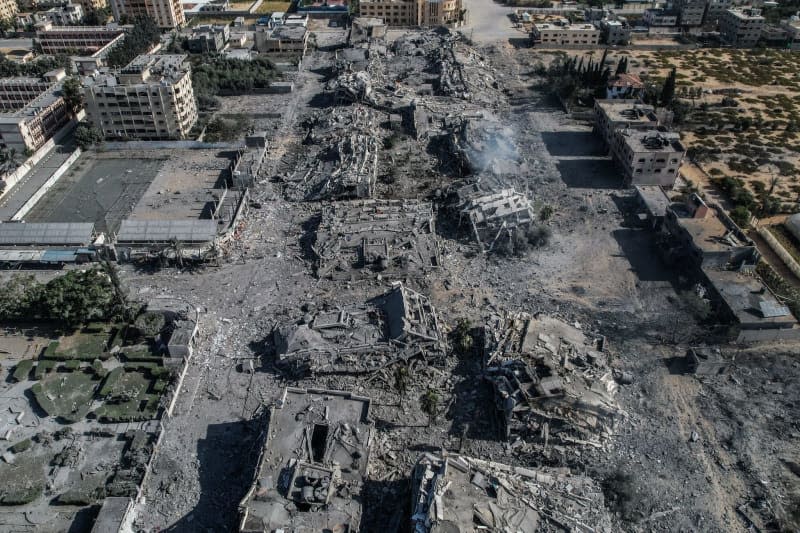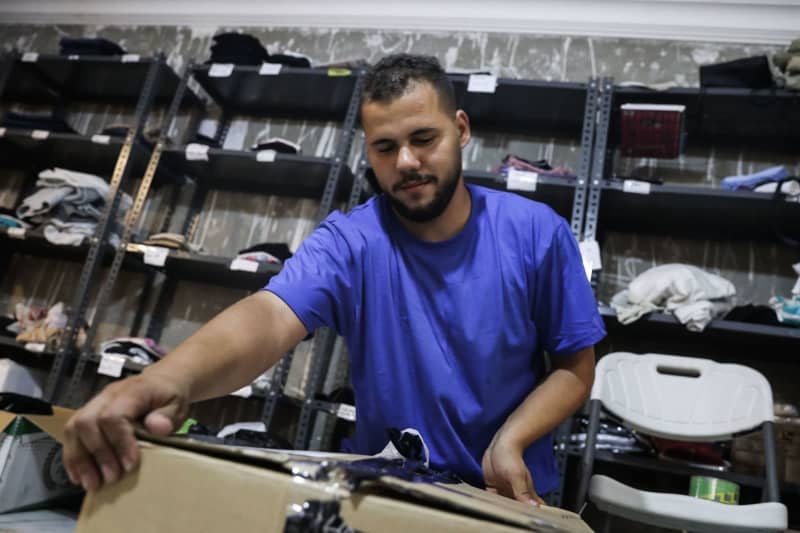Riham is heavily pregnant and just days away from giving birth, but she has no idea who will pay for her hospital costs.
She fled Gaza when she was six months pregnant and has repeatedly appealed to the Palestinian embassy in Egypt for help, so far in vain. “All I got were promises that everything would be fine.”
Riham is one of more than 100,000 Palestinians who have fled to Egypt to escape the fighting in Gaza. “Now I was supposed to give birth in a week and nothing happened.”
Most are in Cairo, stuck in limbo, unable to return to Gaza, but also unable to start a new life.
She and her compatriots do not have the necessary documents and resources to rent an apartment, open a bank account, pay medical bills or send their children to school.
“I have no money, no job, I won’t be able to live,” she says.
Riham is not her real name, she was unwilling to share it with dpa, just like others who were reluctant to appear in the news.
Riham, 28, came to Cairo with her 3-year-old son and her mother-in-law, who has breast cancer.
They did not have enough money for her husband to escape from Gaza, as the departure costs $5,000 and is organized through some dubious Egyptian travel agencies.
They are grateful that at least the Palestinian embassy is paying for an apartment for the three of them. But life is still a struggle amid Israel’s war on Gaza, sparked by the October 7 attacks on Israel by the militant Palestinian organization Hamas.
The United Nations Relief and Works Agency for Palestine Refugees (UNRWA) has no mandate to assist refugees in Egypt and Gazans who have fled there are in need but are not registered as refugees.
Their residence status is unclear, they are stuck in a legal gray zone, tolerated and often invisible in the vast city where 23 million people live. Most have to find a way to make it on their own, or depend on the support of other Palestinians or volunteer organizations.
The issue of their residency status is “the mother of all problems,” Palestinian Ambassador to Egypt Diab al-Louh told dpa.
“I arrived here two weeks ago,” said Chalid, 19. “I am alone and live on the streets most of the time.”
He lost an eye and his arm was seriously injured after a bombing in Gaza – and lay under the rubble for three days. “I have no money, I don’t know where to go.”
He takes out his cell phone and shows the video he has of the moment volunteers pulled him from the rubble. He is almost unrecognizable, his face covered in blood and dust.
Many of those who have fled Gaza are injured and require some form of medical treatment. Some have had a leg or arm amputated, others have burns. Children and young people suffer from trauma. And then there are people with serious health problems, such as cancer patients.
Salma, who was also trapped under the rubble of a collapsed building, suffered serious bruises. She describes how she was tossed back and forth by Egyptian doctors. Quality care is scarce in Egypt, with state hospitals often poorly equipped and staff underpaid.
The war rages on for hours as Israel tries to eliminate Hamas, which attacked locations in southern Israel on October 7, killing some 1,200 people and abducting about 250 others to Gaza.
Israel responded by bombarding Gaza with airstrikes and launched a ground offensive on the closed Palestinian territory in late October with the aim of eliminating Hamas.
More than 37,300 people have been killed and more than 85,000 injured during the Israeli offensive in the Gaza Strip, according to the Hamas-controlled Gaza Health Authority.
The war could last six months or more, Israel’s national security adviser said.
To help Gaza residents in Cairo, a network of volunteers provides as much humanitarian support as possible. Among them is a mother of two who has a full-time job but is looking for storage space for relief supplies that people donate.
Others are doctors who ask their colleagues to treat people at lower costs and communicate via WhatsApp groups.
Another is a businessman who rents out vacant flats in a Cairo suburb and makes them habitable.
One of the first was John Flynn, better known as Quinn, who rushed to Egypt from the US immediately after the October attacks.
He made TikTok videos about his trip, which received offers from viewers willing to offer him a place to stay or pay for his plane ticket, he says. He has now become a kind of grassroots ambassador, bringing people into contact with each other.
Another helper, a 28-year-old Canadian woman, also dropped everything to come to Egypt. She arrived in November and initially planned to stay for only a month.
She remains in Cairo today, working tirelessly to ensure that families receive the essentials day after day.
They are part of a group of 1,600 volunteers who have traveled from places as far away as Ireland, Malaysia and South Africa. Support others remotely by answering legal questions or managing databases.
The source of financial donations is not always clear. A Pakistani says the $644,000 for 29 ambulances he brought to Gaza from Germany was funded by “mainly individuals” and also partly by aid organizations.
The amounts often come from non-governmental organizations abroad or through online donation campaigns. “I have a problem with holding cash that I don’t know where it comes from because it can get quite messy,” says one volunteer.
Flynn moved on to London, where he wants to raise $300,000 from donors to build a community center in Cairo as a first point of contact for Gaza refugees.
No help is available from the Palestinian Authority (PA), which has limited power in the West Bank. “We have no money because of the Israeli siege imposed on us,” said Ambassador Al-Louh. “We are 100% dependent on charities and associations to provide financial assistance.”
Today he is trying to obtain temporary residence permits from the Egyptian government for Palestinians so that they can work legally and send their children to school, at least for the duration of the war.
In eastern Cairo, volunteers turned a few empty flats into a clothing store, removing jeans from cardboard boxes, sorting children’s trainers and hanging blouses on clothes racks. “Welcome to the Pali Boutique,” reads a printed message on the wall, with the flags of Egypt and Palestine underneath.
“We’re just completely overwhelmed by the sheer number of people,” said volunteer Jennifer Mina. To get clothes or milk powder here, you have to sign up for a list. Currently you have to wait a month or more.
About 90% of the volunteers are Palestinians, says Mina, who is from the US and has lived in Egypt for a long time. “They do most of the work themselves,” she says of the Palestinians in Cairo.












